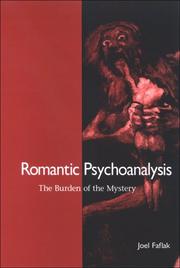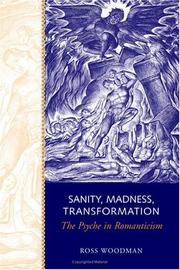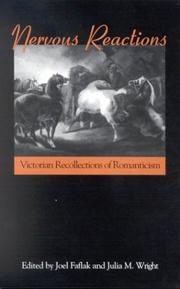| Listing 1 - 10 of 17 | << page >> |
Sort by
|
Book
ISBN: 1487518161 1442699590 1442644303 9781442699595 9781442644304 9781487518165 9781442699601 1442699604 Year: 2017 Publisher: Toronto
Abstract | Keywords | Export | Availability | Bookmark
 Loading...
Loading...Choose an application
- Reference Manager
- EndNote
- RefWorks (Direct export to RefWorks)
"Victorian studies scholars have long studied the impact of Charles Darwin's writings on nineteenth-century culture. However, few have ventured to examine the precursors to the ideas of Darwin and others in the Romantic period. 'Marking time', edited by Joel Faflak, analyses prevailing notions of evolution by tracing its origins to the literary, scientific, and philosophical discourses of the long nineteenth century. The volume's contributors revisit key developments in the history of evolution prior to 'On the origin of species' and explore British and European Romanticism's negotiation between the classic idea of a great immutable chain of being and modern notions of historical change. 'Marking time' reveals how Romantic and post-Romantic configurations of historical, socio-cultural, scientific, and philosophical transformation continue to exert a profound influence on critical and cultural thought."--The dustjacket
Evolution (Biology) --- Evolution (Biology) in literature. --- Philosophy. --- LITERARY CRITICISM / Modern / 19th Century . --- Literature --- Charles Darwin --- Evolution --- Friedrich Wilhelm Joseph Schelling --- Immanuel Kant --- Johann Wolfgang von Goethe --- Thomas Robert Malthus

ISBN: 1435628942 9781435628946 0791479226 9780791472699 0791472698 Year: 2008 Publisher: Albany, New York : State University of New York Press,
Abstract | Keywords | Export | Availability | Bookmark
 Loading...
Loading...Choose an application
- Reference Manager
- EndNote
- RefWorks (Direct export to RefWorks)
In this provocative work, Joel Faflak argues that Romanticism, particularly British Romantic poetry, invents psychoanalysis in advance of Freud. The Romantic period has long been treated as a time of incipient psychological exploration anticipating more sophisticated discoveries in the science of the mind. Romantic Psychoanalysis challenges this assumption by treating psychoanalysis in the Romantic period as a discovery unto itself, a way of taking Freud back to his future. Reading Romantic literature against eighteenth- and nineteenth-century philosophy, Faflak contends that Romantic poetry and prose—including works by Coleridge, De Quincey, Keats, and Wordsworth—remind a later psychoanalysis of its fundamental matrix in phantasy and thus of its profoundly literary nature.
English literature --- Romanticism --- Psychoanalysis and literature. --- Psychoanalysis and literature --- Psychoanalytic Interpretation --- Poetry as Topic --- Literature, Modern --- Psychoanalysis --- Literature --- Behavioral Disciplines and Activities --- Psychiatry --- Humanities --- Behavioral Sciences --- Psychiatry and Psychology --- English Literature --- English --- Languages & Literatures --- Literatures --- Psychodynamic Analysis --- Analyses, Psychodynamic --- Analysis, Psychodynamic --- Psychodynamic Analyses --- Modern Literature --- Interpretation, Psychoanalytic --- Psychoanalytical Interpretation --- Interpretation, Psychoanalytical --- Interpretations, Psychoanalytic --- Interpretations, Psychoanalytical --- Psychoanalytic Interpretations --- Psychoanalytical Interpretations --- Literature and psychoanalysis --- Psychoanalytic literary criticism --- Proxemics --- Behavioral Science --- Proxemic --- Science, Behavioral --- Sciences, Behavioral --- Pseudo-romanticism --- Romanticism in literature --- Aesthetics --- Fiction --- Literary movements --- Psychiatrists --- Psychiatrist --- British literature --- Inklings (Group of writers) --- Nonsense Club (Group of writers) --- Order of the Fancy (Group of writers) --- History and criticism. --- History and criticism --- Coleridge, Samuel Taylor, --- Wordsworth, William, --- De Quincey, Thomas, --- Keats, John, --- Kēts, Tzōn, --- Kits, Dzhon, --- Kʻichʻŭ, --- Quincey, Thomas de, --- De Kvinsi, Tomas, --- Kvinsi, Tomas de, --- De Quincy, Thomas, --- Quincy, Thomas de, --- DeQuincey, Thomas, --- Wœ̄tsawœ̄t, Winlīam, --- Wurdzwurth, Wilyam, --- Varḍsavartha Viliyama, --- Axiologus, --- Coleridge, S. T. --- Kolʹridzh, Samuil, --- Кольридж, Самуил, --- Kolʹridzh, Samuil Teĭlor, --- Кольридж, Самуил Тейлор, --- Kūlīridzh, Ṣāmwīl Tīlūr, --- קולרידג׳, סמיואל טיילור --- Kūlīridj, Ṣāmwīl Tīlūr, --- كولردج، صمويل تيلور, --- קאָלרידש, ס. ט., --- Criticism and interpretation. --- キーツ, ジョン

ISBN: 9780791472699 0791472698 Year: 2008 Publisher: Albany (N.Y.) : State university of New York press,
Abstract | Keywords | Export | Availability | Bookmark
 Loading...
Loading...Choose an application
- Reference Manager
- EndNote
- RefWorks (Direct export to RefWorks)
English literature --- Romanticism --- Psychoanalysis and literature. --- History and criticism. --- Coleridge, Samuel Taylor, --- Wordsworth, William, --- De Quincey, Thomas, --- Keats, John, --- Criticism and interpretation. --- Criticism and interpretation. --- Criticism and interpretation. --- Criticism and interpretation.

ISBN: 0802038417 0802089062 9786612023583 1442610298 1442686286 1282023586 1442679565 9781442686281 9781282023581 9780802038418 9781442610293 6612023589 9781442679566 Year: 2009 Publisher: Toronto
Abstract | Keywords | Export | Availability | Bookmark
 Loading...
Loading...Choose an application
- Reference Manager
- EndNote
- RefWorks (Direct export to RefWorks)
"In Sanity, Madness, Transformation, Ross Woodman offers an extended reflection on the relationship between sanity and madness in Romantic literature. Woodman is one of the field's most distinguished authorities on psychoanalysis and romanticism. Engaging with the works of Northrop Frye, Jacques Derrida, Sigmund Freud, and Carl Jung, he argues that madness is essential to the writings of William Blake, William Wordsworth, and Percy Shelley, and that it has been likewise fundamental to the emergence of the modern subject in psychoanalysis and literary theory. For Frye, madness threatens humanism, whereas for Derrida its relationship is more complex, and more productive. Both approaches are informed by Freudian and Jungian responses to the psyche, which, in turn, are drawn from an earlier Romantic ambivalence about madness." "This work, which began as a collection of Woodman's essays assembled by colleague Joel Faflak, quickly evolved into a new book of original compositions that approach Romanticism from a unique analytic perspective by returning madness to its proper place in the creative psyche. Sanity, Madness, Transformation is a provocative hybrid of theory, literary criticism, and autobiography and is yet another decisive step in a distinguished academic career."--Jacket.
English poetry --- Literature and mental illness. --- Psychoanalysis and literature. --- Romanticism --- Littérature et maladies mentales. --- Poésie anglaise --- Psychanalyse et littérature. --- Romantisme --- History and criticism. --- Histoire et critique. --- Wordsworth, William, --- Blake, William, --- Shelley, Percy Bysshe, --- Criticism and interpretation. --- Sheli, Persi Bish, --- Hsüeh-lai, --- Hermit of Marlow, --- Marlow, --- Victor, --- Shelli, Persi-Bishi, --- Šéli, Pérsi Ba, --- Shilī, --- Shelley, P. B. --- Selley, Persy Byss, --- Shelli, P., --- Шелли, Перси Биши, --- שלי, פרסי ביש --- שלי, פרסי ביש, --- שעלי, פוירסי --- شلي --- Śeli, Pārsi Bīśa, --- Blake, W. --- Bleĭk, Uilʹi︠a︡m, --- בליק, ויליאם --- בלייק, ויליאם --- בליק, ויליאם, --- בלייק, ויליאם, --- Literature and psychoanalysis --- Psychoanalytic literary criticism --- Literature --- Authors, Insane --- Mental illness and literature --- Poets, Insane --- Wœ̄tsawœ̄t, Winlīam, --- Wurdzwurth, Wilyam, --- Varḍsavartha Viliyama, --- Axiologus, --- Great Britain. --- Anglia --- Angliyah --- Briṭanyah --- England and Wales --- Förenade kungariket --- Grã-Bretanha --- Grande-Bretagne --- Grossbritannien --- Igirisu --- Iso-Britannia --- Marea Britanie --- Nagy-Britannia --- Prydain Fawr --- Royaume-Uni --- Saharātchaʻānāčhak --- Storbritannien --- United Kingdom --- United Kingdom of Great Britain and Ireland --- United Kingdom of Great Britain and Northern Ireland --- Velikobritanii͡ --- Wielka Brytania --- Yhdistynyt kuningaskunta --- Northern Ireland --- Scotland --- Wales
Book
ISBN: 9781474425551 1474425550 1474418554 1474401627 9781474401623 9781474401616 1474401619 9781474410229 1474410227 Year: 2016 Publisher: Edinburgh
Abstract | Keywords | Export | Availability | Bookmark
 Loading...
Loading...Choose an application
- Reference Manager
- EndNote
- RefWorks (Direct export to RefWorks)
This new Companion surveys the traditions and conventions of the dark side of American culture
Gothic novel. --- Kultur. --- USA. --- Gothic fiction (Literary genre), American --- Popular culture --- Literature and society --- American gothic fiction (Literary genre) --- American fiction --- History and criticism. --- History and criticism --- Gothic fiction (Literary genre) [American ] --- United States --- Brown, Charles Brockden --- Oates, Joyce Carol --- Criticism and interpretation --- United States. --- AB --- ABSh --- Ameerika Ühendriigid --- America (Republic) --- Amerika Birlăshmish Shtatlary --- Amerika Birlăşmi Ştatları --- Amerika Birlăşmiş Ştatları --- Amerika ka Kelenyalen Jamanaw --- Amerika Qūrama Shtattary --- Amerika Qŭshma Shtatlari --- Amerika Qushma Shtattary --- Amerika (Republic) --- Amerikai Egyesült Államok --- Amerikanʹ Veĭtʹsėndi͡avks Shtattn --- Amerikări Pĕrleshu̇llĕ Shtatsem --- Amerikas Forenede Stater --- Amerikayi Miatsʻyal Nahangner --- Ameriketako Estatu Batuak --- Amirika Carékat --- AQSh --- Ar. ha-B. --- Arhab --- Artsot ha-Berit --- Artzois Ha'bris --- Bí-kok --- Ē.P.A. --- EE.UU. --- Egyesült Államok --- ĒPA --- Estados Unidos --- Estados Unidos da América do Norte --- Estados Unidos de América --- Estaos Xuníos --- Estaos Xuníos d'América --- Estatos Unitos --- Estatos Unitos d'America --- Estats Units d'Amèrica --- Ètats-Unis d'Amèrica --- États-Unis d'Amérique --- Fareyniḳṭe Shṭaṭn --- Feriene Steaten --- Feriene Steaten fan Amearika --- Forente stater --- FS --- Hēnomenai Politeiai Amerikēs --- Hēnōmenes Politeies tēs Amerikēs --- Hiwsisayin Amerikayi Miatsʻeal Tērutʻiwnkʻ --- Istadus Unidus --- Jungtinės Amerikos valstybės --- Mei guo --- Mei-kuo --- Meiguo --- Mî-koet --- Miatsʻyal Nahangner --- Miguk --- Na Stàitean Aonaichte --- NSA --- S.U.A. --- SAD --- Saharat ʻAmērik --- SASht --- Severo-Amerikanskie Shtaty --- Severo-Amerikanskie Soedinennye Shtaty --- Si͡evero-Amerikanskīe Soedinennye Shtaty --- Sjedinjene Američke Države --- Soedinennye Shtaty Ameriki --- Soedinennye Shtaty Severnoĭ Ameriki --- Soedinennye Shtaty Si͡evernoĭ Ameriki --- Spojené obce severoamerick --- Spojené staty americk --- SShA --- Stadoù-Unanet Amerika --- Stáit Aontaithe Mheirice --- Stany Zjednoczone --- Stati Uniti --- Stati Uniti d'America --- Stâts Unîts --- Stâts Unîts di Americhe --- Steatyn Unnaneysit --- Steatyn Unnaneysit America --- SUA --- Sŭedineni amerikanski shtati --- Sŭedinenite shtati --- Tetã peteĩ reko Amérikagua --- U.S. --- U.S.A. --- United States of America --- Unol Daleithiau --- Unol Daleithiau America --- Unuiĝintaj Ŝtatoj de Ameriko --- US --- USA --- Usono --- Vaeinigte Staatn --- Vaeinigte Staatn vo Amerika --- Vereinigte Staaten --- Vereinigte Staaten von Amerika --- Verenigde State van Amerika --- Verenigde Staten --- VS --- VSA --- Wááshindoon Bikéyah Ałhidadiidzooígí --- Wilāyāt al-Muttaḥidah --- Wilāyāt al-Muttaḥidah al-Amirīkīyah --- Wilāyāt al-Muttaḥidah al-Amrīkīyah --- Yhdysvallat --- Yunaeted Stet --- Yunaeted Stet blong Amerika --- ZDA --- Združene države Amerike --- Zʹi͡ednani Derz͡havy Ameryky --- Zjadnośone staty Ameriki --- Zluchanyi͡a Shtaty Ameryki --- Zlucheni Derz͡havy --- ZSA --- Gothic fiction (Literary genre), American. --- American literature. --- English literature --- Agrarians (Group of writers)
Book
ISBN: 1442662956 9781442662957 9780802092137 0802092136 Year: 2011 Publisher: Toronto
Abstract | Keywords | Export | Availability | Bookmark
 Loading...
Loading...Choose an application
- Reference Manager
- EndNote
- RefWorks (Direct export to RefWorks)
Ross Woodman's Sanity, Madness, Transformation was an adventurous exploration of the links between madness in Romantic writing and modern literary and psychoanalytic theory. Revelation and Knowledge picks up where his previous work left off by tracing the profound connections and gaps between religious and poetic faith in the works of the British Romantic poets.Woodman and Joel Faflak focus on the clash in these authors' works between depth psychology and mysticism in the context of post-Enlightenment crises of belief. They also delve into the treatment of revelation in Romantic poetry, expanding on the concept through nuanced examinations of specific Eastern and Western religious traditions. Revelation and Knowledge showcases Woodman's trademark ability to combine literary criticism with autobiography, resulting in a surprising work that is also uniquely daring.
English poetry --- Religion and literature --- Religion in literature. --- Revelation in literature. --- Romanticism --- Religion in drama --- Religion in poetry --- Literature --- Literature and religion --- History and criticism. --- History --- Moral and religious aspects --- England. --- Angleterre --- Anglii͡ --- Anglija --- Engeland --- Inghilterra --- Inglaterra
Book
ISBN: 1442690011 1442665750 9781442690011 9781442641846 1442641843 Year: 2013 Publisher: Toronto
Abstract | Keywords | Export | Availability | Bookmark
 Loading...
Loading...Choose an application
- Reference Manager
- EndNote
- RefWorks (Direct export to RefWorks)
The Public Intellectual and the Culture of Hope brings together a number of winners of the Polanyi Prize in Literature - a group whose research constitutes a diversity of methodological approaches to the study of culture - to examine the rich but often troubled association between the concepts of the public, the intellectual (both the person and the condition), culture, and hope. The contributors probe the influence of intellectual life on the public sphere by reflecting on, analyzing, and re-imagining social and cultural identity. The Public Intellectual and the Culture of Hope reflects on the challenging and often vexed work of intellectualism within the public sphere by exploring how cultural materials - from foundational Enlightenment writings to contemporary, populist media spectacles - frame intellectual debates within the clear and ever-present gaze of the public writ large. These serve to illuminate how past cultures can shed light on present and future issues, as well as how current debates can reframe our approaches to older subjects.
Intellectuals --- Intellectual life. --- Cultural life --- Culture --- Intelligentsia --- Persons --- Social classes --- Specialists --- Social conditions.
Book
ISBN: 1487506562 9781487506568 Year: 2020 Publisher: Toronto University of Toronto Press
Abstract | Keywords | Export | Availability | Bookmark
 Loading...
Loading...Choose an application
- Reference Manager
- EndNote
- RefWorks (Direct export to RefWorks)
Book
ISBN: 9781107052390 9781107280564 9781107637283 9781139871198 1139871196 1107280567 1107052394 1139699377 1139862421 1139861182 1139865463 1139863320 1139869043 1107637287 Year: 2014 Publisher: New York
Abstract | Keywords | Export | Availability | Bookmark
 Loading...
Loading...Choose an application
- Reference Manager
- EndNote
- RefWorks (Direct export to RefWorks)
There has recently been a resurgence of interest in the importance of the emotions in Romantic literature and thought. This collection, the first to stress the centrality of the emotions to Romanticism, addresses a complex range of issues including the relation of affect to figuration and knowing, emotions and the discipline of knowledge, the motivational powers of emotion, and emotions as a shared ground of meaning. Contributors offer significant new insights on the ways in which a wide range of Romantic writers, including Jane Austen, William Wordsworth, Immanuel Kant, Lord Byron, Mary and Percy Bysshe Shelley, Thomas De Quincey and Adam Smith, worried about the emotions as a register of human experience. Though varied in scope, the essays are united by the argument that the current affective and emotional turn in the humanities benefits from a Romantic scepticism about the relations between language, emotion and agency.

ISBN: 9781417577568 0791485595 1417577568 9781417577569 9780791485590 0791459713 9780791459713 0791459721 9780791459720 Year: 2004 Publisher: Albany : State University of New York Press,
Abstract | Keywords | Export | Availability | Bookmark
 Loading...
Loading...Choose an application
- Reference Manager
- EndNote
- RefWorks (Direct export to RefWorks)
Nervous Reactions considers Victorian responses to Romanticism, particularly the way in which the Romantic period was frequently constructed in Victorian-era texts as a time of nervous or excitable authors (and readers) at odds with Victorian values of self-restraint, moderation, and stolidity. Represented in various ways—as a threat to social order, as a desirable freedom of feeling, as a pathological weakness that must be cured—this nervousness, both about and of the Romantics, is an important though as yet unaddressed concern in Victorian responses to Romantic texts. By attending to this nervousness, the essays in this volume offer a new consideration not only of the relationship between the Victorian and Romantic periods, but also of the ways in which our own responses to Romanticism have been mediated by this Victorian attention to Romantic excitability.Considering editions and biographies as well as literary and critical responses to Romantic writers, the volume addresses a variety of discursive modes and genres, and brings to light a number of authors not normally included in the longstanding category of "Victorian Romanticism": on the Romantic side, not just Wordsworth, Keats, and P. B. Shelley but also Byron, S. T. Coleridge, Thomas De Quincey, Mary Shelley, and Mary Wollstonecraft; and on the Victorian side, not just Thomas Carlyle and the Brownings but also Sara Coleridge, George Eliot, Elizabeth Gaskell, Archibald Lampman, and J. S. Mill.Contributors include D. M. R. Bentley, Kristen Guest, Joel Faflak, Grace Kehler, Donelle Ruwe, Alan Vardy, Lisa Vargo, Timothy J. Wandling, Joanne Wilkes, and Julia M. Wright.
Romanticism --- Influence (Literary, artistic, etc.) --- English literature --- History --- History and criticism. --- Artistic impact --- Artistic influence --- Impact (Literary, artistic, etc.) --- Literary impact --- Literary influence --- Literary tradition --- Tradition (Literature) --- Art --- Influence (Psychology) --- Literature --- Intermediality --- Intertextuality --- Originality in literature
| Listing 1 - 10 of 17 | << page >> |
Sort by
|

 Search
Search Feedback
Feedback About UniCat
About UniCat  Help
Help News
News